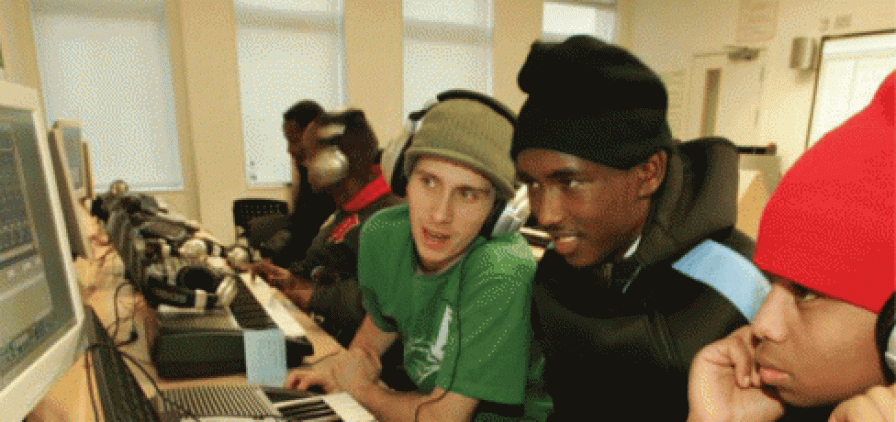Organisations' Journeys Through Music-based Mentoring: Key Changes Sound System, London

A Case Study from the Youth Music Mentors programme...
This page is part of a resource pack on Music-based mentoring.
ABOUT key changes sound system
KC Sound System is a structured creative music programme for young adult mental health service users resident in Camden, London. It is produced by Islington Music Forum, a mental health music charity set up by service-users in 1998, and delivered in partnership with the Camden and Islington NHS Mental Health Foundation Trust with referrals from the trust's Early Intervention services, Community Mental Health Teams and Highgate and St. Pancras hospitals. Its objective is to move people on to new life opportunities in employment, education, volunteering and training, underpinned by the promotion of recovery from mental illness. There is a 50/50 male/female ratio.
Key Changes Sound system and music-based mentoring
There is a pool of 10 mentors, some volunteers, who receive in- house training including mental health awareness training; there are also two peer mentors and one trainee.
The programme’s manager is Peter Leigh, who was previously Youth Music Mentors project coordinator for London. Peter is committed to developing high quality performance and recording outcomes as well as positive personal development and recovery for the mentees, some of whom have little previous experience of either performance or recording. "Quality,” he says, “is embedded in process and particularly performance." Performance and recording, getting the music out there, is at the centre of what Key Changes does. This is as much to help the mentees’ self-confidence as it is for musical reason. "Gigging so many times that the fear factor has gone forever. You are not scared of what people think of you,” says mentor Colin.
Peter promotes a non-hierarchical atmosphere where the mentees take control and become empowered. Mentees welcome the equality in the relationship: "Peter wants to know what it’s like, how you are doing. You don't have to worry about what is going on in the background. It's easy to take on the challenge of the musical task. He is always on the level – not someone with authority who speaks down to people."
Participants are referred to the project by health and social care professionals including care coordinators, psychiatrists, psychologists, social workers, occupational therapists and ward staff. Each mentee has an initial interview which is also a mental health and risk assessment; occasionally serious concerns about individual risk factors mean that engagement is delayed and the situation reviewed at a later date. Ongoing contact is maintained with referral partners through engagement. Feedback on any changes in individual behaviour or health indicators is an important part of the mentoring relationship and informs clinical reviews and care planning.
The mentees have had two-hour sessions once a week for 15 weeks and many mentees also do concerts and shows. Peter feels this is long enough to get them moved on well. They work in groups and there is a very open-minded attitude to genre, blending such things as funk, hip-hop and death metal with complete acceptance.
A typical session would be:
- group check-in, question of the week
- short vocal workshop
- two to three presentations from the group
- small group work
- music sharing
- ending
The sessions motivate the mentees and are a beacon of inspiration for them during the week. They jam and work collaboratively together. "Week after week the same people come. They express themselves, look forward to it. They are there on time or early and stay till the end. They don't want the session to end. We channel that into a structure they can use outside the session – in their bedrooms, clubs, says mentor Mark. "How we work is a collaborative process. There are a lot of opinions. We usually start a song from nothing – somebody starts doing something on piano, someone on drum, someone raps. Then we say wait, wait – let's record that. When we have the bones, we compartmentalise it. The singers work on one side, instrumentalists do their thing. As with most bands there's a lot of noise and voices,” explains Colin.
One mentee, an inpatient, did a DJ workshop and then joined the community programme from the start. He got on a production course, played concerts with KC. He has done a number of gigs which have raised his confidence and self-esteem, his life opportunities and creativity. This has been profoundly beneficial to his mental health over an 18 month period. Some mentees have gone on to study instruments at the Mary Ward Centre in Camden; others have done volunteering or paid employment in workshops assisting activity. “KC has helped me have more balance on my life and boosted my confidence ... it has helped me be more embracing of myself,” explained a mentee.
Key Changes has secured funding to develop music mentor training and introduce taster sessions to other NHS mental health trusts.
What the MENTORS say
“How we work is a collaborative process. There are a lot of opinions. We usually start a song from nothing – somebody starts doing something on piano, someone on drum, someone raps .Then someone says wait, wait, lets record that . When we have the bones, we compartmentalize it – singers work on one side and instrumentalists do their thing.”
“Key Changes has helped me have more balance on my life and boosted my confidence in the everyday life encounters that I go through. It has helped me deal with situations and problems – helped me be more embracing of myself in everything I do.”
“If it wasn’t for music I would probably be 6 ft under. It has helped me stay focused, physically as well. I saw a lot of stuff when I was growing up. Music helped me to elaborate, to stay on point, and stay focused”

